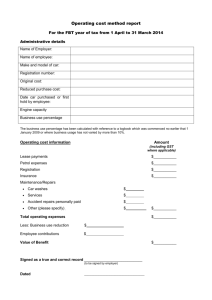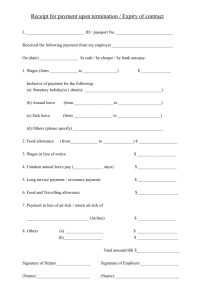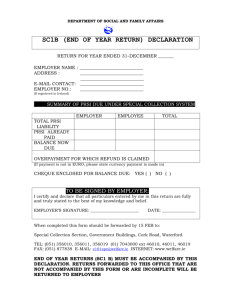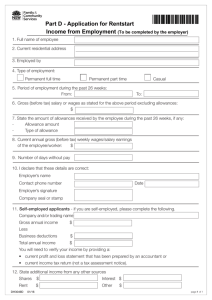Criteria for the payment of Country Money
advertisement
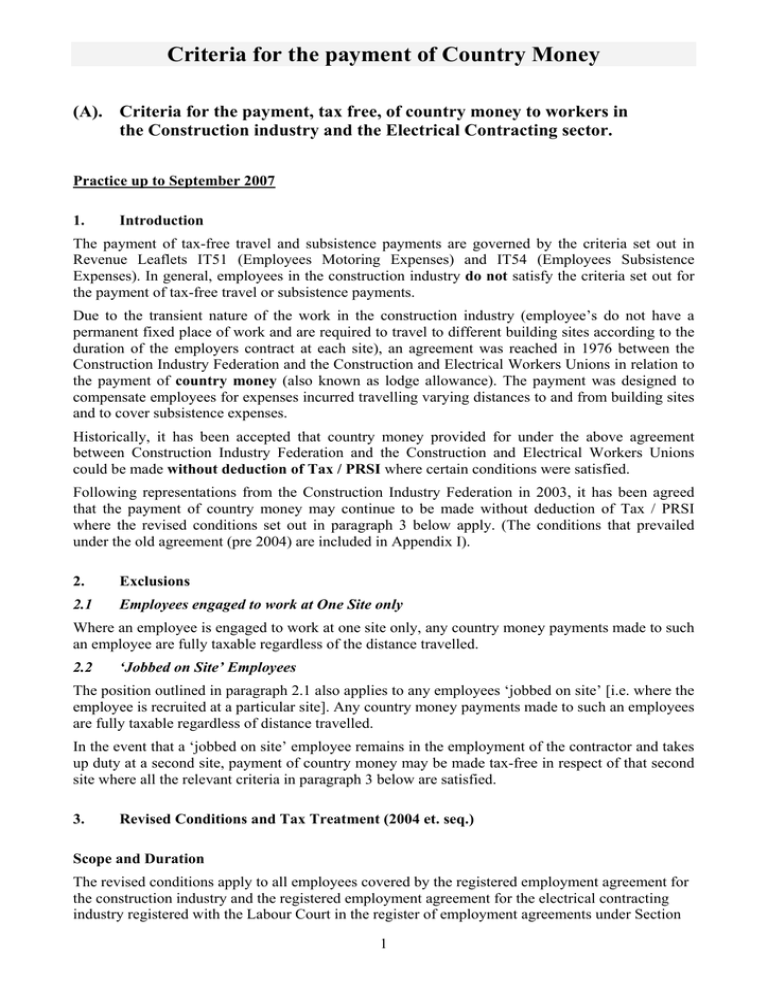
Criteria for the payment of Country Money (A). Criteria for the payment, tax free, of country money to workers in the Construction industry and the Electrical Contracting sector. Practice up to September 2007 1. Introduction The payment of tax-free travel and subsistence payments are governed by the criteria set out in Revenue Leaflets IT51 (Employees Motoring Expenses) and IT54 (Employees Subsistence Expenses). In general, employees in the construction industry do not satisfy the criteria set out for the payment of tax-free travel or subsistence payments. Due to the transient nature of the work in the construction industry (employee’s do not have a permanent fixed place of work and are required to travel to different building sites according to the duration of the employers contract at each site), an agreement was reached in 1976 between the Construction Industry Federation and the Construction and Electrical Workers Unions in relation to the payment of country money (also known as lodge allowance). The payment was designed to compensate employees for expenses incurred travelling varying distances to and from building sites and to cover subsistence expenses. Historically, it has been accepted that country money provided for under the above agreement between Construction Industry Federation and the Construction and Electrical Workers Unions could be made without deduction of Tax / PRSI where certain conditions were satisfied. Following representations from the Construction Industry Federation in 2003, it has been agreed that the payment of country money may continue to be made without deduction of Tax / PRSI where the revised conditions set out in paragraph 3 below apply. (The conditions that prevailed under the old agreement (pre 2004) are included in Appendix I). 2. Exclusions 2.1 Employees engaged to work at One Site only Where an employee is engaged to work at one site only, any country money payments made to such an employee are fully taxable regardless of the distance travelled. 2.2 ‘Jobbed on Site’ Employees The position outlined in paragraph 2.1 also applies to any employees ‘jobbed on site’ [i.e. where the employee is recruited at a particular site]. Any country money payments made to such an employees are fully taxable regardless of distance travelled. In the event that a ‘jobbed on site’ employee remains in the employment of the contractor and takes up duty at a second site, payment of country money may be made tax-free in respect of that second site where all the relevant criteria in paragraph 3 below are satisfied. 3. Revised Conditions and Tax Treatment (2004 et. seq.) Scope and Duration The revised conditions apply to all employees covered by the registered employment agreement for the construction industry and the registered employment agreement for the electrical contracting industry registered with the Labour Court in the register of employment agreements under Section 1 Criteria for the payment of Country Money 28 of the Industrial Relations Act, 1946. The revised conditions outlined below are subject to review by the Revenue Commissioners or the Construction Industry Federation. Country money may be made tax free where: For Dublin Based Contractors: • the individual is employed by a construction company and is working at a site which is 20 miles or more from the G.P.O., • the employee actually incurs the expense of travelling to and from the site, • the employee is not provided with board and lodgings by the employer, • the employee is not provided with transport to and from the site by the employer, • the employee is not recruited on site or at the employer’s head office or elsewhere to work at one site only. For Country Based Contractors: • in the case of the construction industry, the individual is employed by the construction company and working at a site which is 30 miles or more from the employer’s base, • in the case of the electrical contracting sector, the individual is employed by the company and working at a site which is 20 miles or more from the employer’s base, • the employee actually incurs the expense of travelling to and from the site, • the employee is not provided with board and lodgings by the employer, • the employee is not provided with transport to and from the site by the employer, • the employee is not recruited on site or at the employer’s head office or elsewhere to work at one site only. If any of the conditions are not satisfied, any country money paid must be subjected to Tax / PRSI deductions. 4. Salary Substitution Country money is payable in addition to the normal pay rate applicable for employees. In the event that the normal pay rate is suppressed and the country money payment is being used to avoid Tax / PRSI deductions due on the normal pay rate applicable, the payment no longer qualifies as tax free. (B). Practice with effect from 1st October 2007 for all Site Based Employees - Extract from SP-IT/2/07 4.6 Site-Based Employees 4.6.1 General A site-based employee may be described as one who does not have a fixed base and who, in the course of his/her employment, performs substantive duties on behalf of his/her employer at different locations (generally, for periods longer than one day) [e.g. employees in the building industry]. 2 Criteria for the payment of Country Money 4.6.2 Tax treatment of expenses paid (including ‘country money’) to site-based employees In many instances, the payment or reimbursement of expenses by employers to site-based employees is governed by the terms of an Employment Agreement between employee representative groups and employer representative groups and registered in the Register of Employment Agreements maintained by the Labour Court. The Revenue Commissioners accept that expenses of travel and subsistence not exceeding the rates outlined in paragraph 6 below may, subject to the exclusions in paragraph 4.6.3 below, be paid taxfree to a site-based employee where such employee is employed and working at a site which is 32km (20 miles) or more from the employer’s base. Where, for employees in the construction and electrical contracting industries in the Dublin area, travel and subsistence is calculated by reference to distances from the General Post Office (GPO), the GPO may continue to be treated as the employer’s base for the purpose of this tax treatment (provided, of course, this method is used on a consistent basis). 4.6.3 Exclusions from tax treatment at paragraph 4.6.2 above The tax-free treatment of expenses outlined in paragraph 4.6.2 above does not apply where: (i) the employee does not incur the expense of travelling to and from the site i.e. the employee is provided with transport to and from the site by the employer); or (ii) the employee is provided with board and lodgings by the employer; or (iii) the employee is recruited to work at one site only. Furthermore, the tax treatment at paragraph 4.6.2 above does not apply to ‘jobbed on site’ employees. However, where an individual who was originally engaged as a ‘jobbed on site’ employee remains in the same employment and takes up duty at other sites, payment of expenses of travel and subsistence, not exceeding the rate outlined in paragraph 6 below, may be paid tax-free in respect of the second site and subsequent sites where all the relevant criteria are satisfied. 4.6.4 ‘Eating on Site’ Allowance An “eating on site” allowance is paid to site-based employees in some sectors of the economy. The following conditions must be adhered to before such an allowance can be paid tax-free: (i) facilities for making tea, coffee, etc. are not provided on the site by the employer; (ii) the employee is not in receipt of any other form of tax-free subsistence payment; (iii) the employee works on the site for at least 1.5 hours before and 1.5 hours after normal lunch break; (iv) the allowance is no more than €5 per day. 5. Revenue Audit It is accepted that the payment of country money / subsistence allowances in the circumstances outlined and subject to the conditions set out, no more than reimburses employees for expenses wholly, exclusively and necessarily incurred. All records relating to the country money / subsistence allowance payments must be retained by the employer and may be examined in the 3 Criteria for the payment of Country Money event of a Revenue audit. These records must be kept for six years unless the tax office indicates otherwise. The operation of the rules and conditions for the payment or reimbursement of country money / subsistence allowances without deduction of tax will be a feature of Revenue’s Audit and Compliance programmes. Employers must ensure that those rules and conditions are complied with. 6. Current Rates The current rates of country money in force for the Construction Industry and the Construction and Electrical Contractors Association are highlighted in the table below. The rates and conditions pre 2004 are in Appendix I. COUNTRY MONEY WEEKLY RATES: 2004 – 2009 (August) With effect from 1 July 2008 1 Jan 2008 1 July 2007 1 Jan 2007 1 July 2006 1 Jan 2006 1 July 2005 1 Jan 2005 1 July 2004 Construction €181.68* €176.90 €173.60 €168.54 €165.24 €161.37 €159.14 €157.25 €155.39 With effect from Electrical 1 April 2007** €168.26 1 April 2006 €161.17 1 April 2005 €157.09 1 April 2004 €152.66 * There has been no change in the rate for the Construction Industry since July 2008. ** There has been no change in the rate for the Electrical Contractors Association since April 2007. Current Daily Rate: Under “Clause 8(c) Registered Employment Agreement - 21 July 1986” ‘Subsistence allowance (country money) shall be: Construction Industry Federation: Electrical Contractors Association: *€181.68 per week for 5,6 or 7 days *€36.34 per day for 4 days or less from 1st JULY 2008 The allowance will be increased every 6 months in accordance with the increase in the consumer price index. *€168.26 per week for 5,6 or 7 days *€33.65 per day for 4 days or less from 1st APRIL 2007 The allowance will be increased every 12 months in accordance with the increase in the consumer price index. * Rate changes in accordance with the above table 4 Criteria for the payment of Country Money APPENDIX I Criteria for paying Country Money tax-free in years prior to 2004 For Dublin Based Employers • the individual is employed by the company and is working at a site which is 20 miles or more from the G.P.O. , • the employee is not recruited on site or at the employer’s head office or elsewhere to work at that site only, • the employee actually incurs the expense of travelling to and from the site, • the employee is not provided with board and lodgings by the employer, • the employee is not provided with transport to and from the site by the employer. For Country Based Employers • the individual is employed by the company and working at a site which (a) in the case of the construction industry is 30 – 35 miles or more from the employer’s base - the 30 – 35 miles rule depends on the local agreement in place; (b) in the case of the electrical contracting sector of the building industry is 20 miles or more from the employer’s base, • the employee is not recruited on site or at the employer’s head office or elsewhere to work at that site only, • the employee actually incurs the expense of travelling to and from the site, • the employee is not provided with board and lodgings by the employer - in the case of the construction industry ( as distinct from the electrical contracting sector of the building industry) the employee must actually stay in accommodation away from home, • the employee is not provided with transport to and from work by the employer. If any of the conditions are not satisfied, any country money paid must be subjected to Tax / PRSI deductions. 5 Criteria for the payment of Country Money Country Money: Weekly Rates Prior to 2004 (please see page 4 for current rates) Table † With Effect From: 01/01/1995 01/07/1995 01/01/1996 01/07/1996 01/01/1997 01/07/1997 01/01/1998 01/07/1998 01/01/1999 01/07/1999 01/01/2000 01/07/2000 01/01/2001 01/07/2001 01/01/2002 01/01/2003 01/07/2003 Construction £ 91.44 £ 93.18 £ 93.65 £ 94.49 £ 95.43 £ 95.91 £ 96.96 £ 98.51 £ 99.00 £100.00 £101.10 £105.14 £108.19 £110.86 €142.58 €149.50 €152.79 Daily Rates: Prior to Year 2004 With Effect From: Electrical 01/07/1995 £ 93.11 01/07/1996 £ 94.41 01/07/1997 £ 95.83 01/07/1998 £ 98.42 01/07/1999 £ 99.90 01/07/2000 £105.09 01/04/2001 £108.15 01/04/2002 01/04/2003 €142.53 €149.37 (please see page 4 for current rates) Under “Clause 8(c) Registered Employment Agreement - 21 July 1986” ‘Subsistence allowance (country money) shall be: Construction Industry Federation: Electrical Contractors Association: *€152.79 per week for 5,6 or 7 days *€30.56 per day for 4 days or less from 1st JULY 2003 The allowance will be increased every 6 months in accordance with the increase in the consumer price index. *€149.37 per week for 5,6 or 7 days *€29.87 per day for 4 days or less from 1st APRIL 2003 The allowance will be increased every 12 months in accordance with the increase in the consumer price index. * Rate changes in accordance with the Table† above. 6

